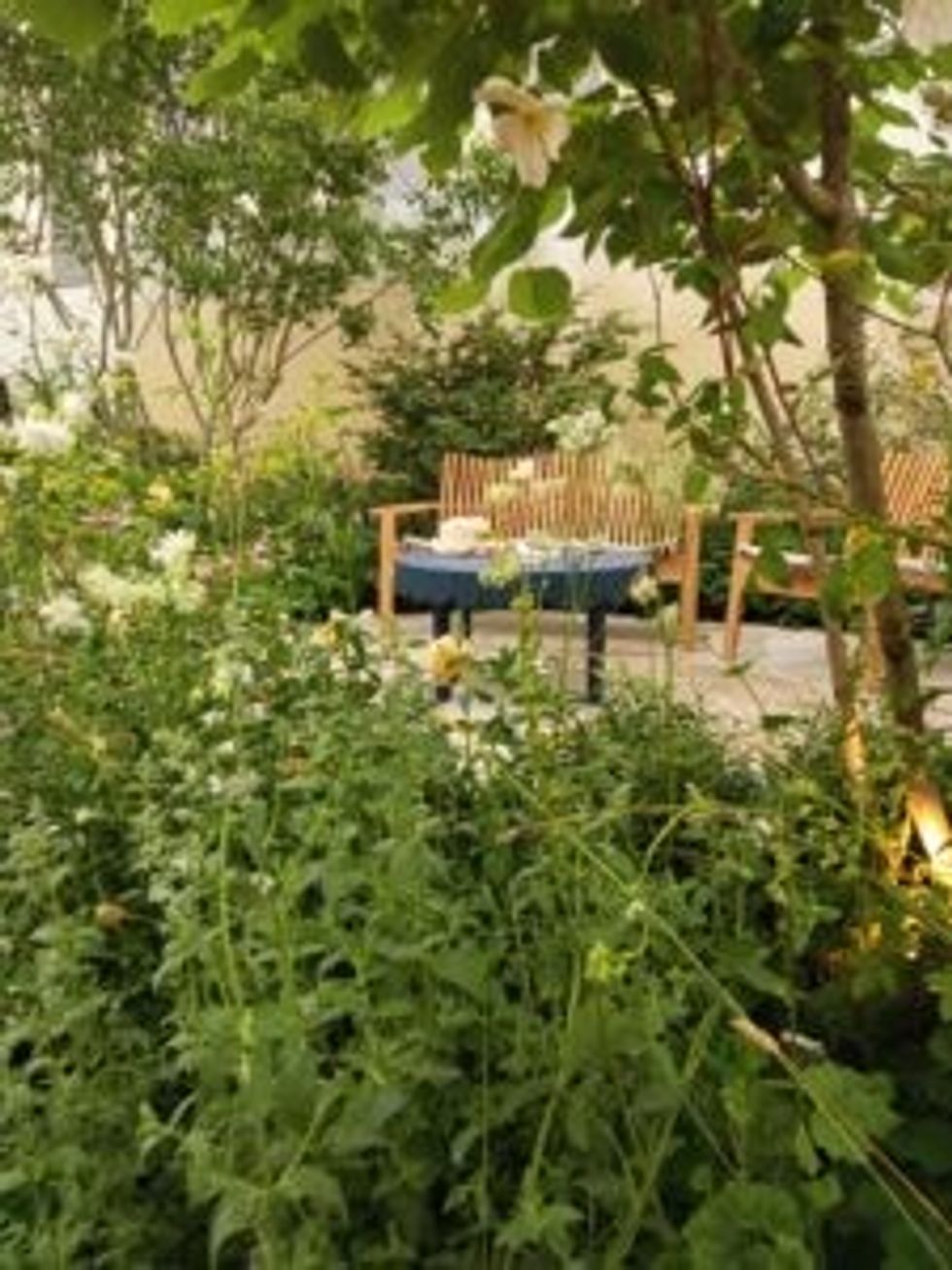HOW does one go about creating a bereavement garden to help deal with grief at the loss of a family member or friend?
British Asians can create such a garden by drawing inspiration from one of the entries at this year’s Chelsea Flower Show.
The ‘Sue Ryder Grief Kind Garden’, which was visited by Queen Camilla, and also won a gold medal in the people’s choice category, was created by Katherine Holland in memory of her mother who passed away four years ago.
Holland has added a poignant touch by placing her mother’s secateurs and hat on a table in the garden.
“I wanted to bring her to Chelsea with me,” she said.
She has collaborated with Sue Ryder, “a British palliative and bereavement support charity. Formed as the Sue Ryder Foundation in 1953 by World War II special operations executive volunteer Sue Ryder, the organisation provides care and support for people living with terminal illnesses and neurological conditions, as well as individuals who are coping with a bereavement.”
King Charles has just become the charity’s royal patron.
Some of Holland’s ideas for a personalised garden could be adapted by British Asians, for example, by including plants or objects that remind them of their lost relative or friend.
Holland told Eastern Eye: “I partnered with Sue Ryder to make a ‘Grief Kind Garden’. The idea is that it essentially gives you a green hug. It provides somewhere that’s safe for you to sit and speak to someone about your grief. Or you can just sit and have a moment of reflection and remember the person you have lost.”
She added: “We’ve tried to include a lot of sensory plants, so there’s something for everybody. There could be a sense of smell.
There are tactile leaves, or plants that are pollinators. You can watch bees buzzing around or hear the sound of the bees visiting different plants.
“We’ve got roses in there for fragrance. We’ve Calycanthus Venus.”
The latter is a hardy deciduous shrub that bears large, fragrant blooms. The flowers are creamy white in colour with a burgundy centre. Blooms appear from May right through to September, giving a spectacular display and scent.
Holland explained: “The reason for the garden was based on my own experiences. My mum died just under four years ago. I sometimes felt my grief was misunderstood. And sometimes I felt quite alone. And that’s why I was drawn to Sue Ryder because they have all of these amazing free resources available for help and support – whether it’s a person going through grief or whether it’s supporting someone else going through grief.”
Her mother, she recalled, “told me everything I know about gardening. I worked in a completely different career previously. It was only when she was ill, I took a career break and left my job, and retrained as a garden designer after she died. I used to do financial risk management. And now I’m a garden designer. It was my experiences of grief, which led me to working with Sue Ryder and trying to use planting as a means of starting conversations and helping people open up about their grief.”
The gardens could be big or small.
“Even if you have only a balcony, you can create your own sanctuary. If you’ve only got a small space, you can get a pot with one large shrub in it.”
She described the garden she had designed for Chelsea: “We’ve got Mahonia ‘Sweet Winter’, an evergreen plant. But it’s a very, very tactile one. It’s not like the kind of prickly Mahonias you normally get. It has yellow flowers in winter.
“I’ve also got Sarcoccoca Purple Gem, which is very low growing, and gives you winter white flowers which are really fragrant. Most of the plants you can leave throughout the winter just for their structure. There are grasses in there. When you have frost, they look beautiful; you get movement in the wind. People grieve every single day of the year, and therefore they need a space every single day of the year.”
The chairs and bench in the garden are deliberately slatted. “I like how you can see through them because I find a lot of benches are very solid, whereas these have this really organic natural shape.”
As soon as Chelsea opened, “so many people came and opened up about their stories,” said Holland. “They wanted to sit in the garden and share their own experiences of loss.”
The botanical names of some of the key plants and shrubs include Alchemilla sericata ‘Gold Strike’; Geranium ‘Eureka Blue’; Gillenia trifoliata; Mahonia eurybracteata ‘Sweet Winter’; Nepeta racemosa Amelia; Polystichum setiferum ‘Herrenhausen’; and Tiarella ‘Running Tiger’.
However, British Asians can have their own choice of plants.
A Sye Ryder employee, standing alongside Holland, commented: “This will live on as a garden for our patients and their families. We have hospices around the UK. This garden will move to a hospice in Bedfordshire. This garden is all about having a tranquil, safe, peaceful spot to sit and remember people.”
The charity said: “At the heart of the garden, there is a welcoming seating area set around a coffee table, highlighting the importance of starting conversations around grief with others. Katherine has drawn from her own experience of grief to create a garden she hopes will offer comfort to others.”
The garden would have “a display of personal objects symbolising loved ones who have died”.
The charity added: “Sue Ryder is here to make sure everyone approaching the end of their life or living with grief can access the support they need. The Sue Ryder Grief Kind Garden explores the theme of grief, providing a safe and peaceful sanctuary in which to sit and be enveloped in the beauty of nature. Visitors are encouraged to share their experiences of grief or take a moment for quiet reflection.
“The garden’s theme has been inspired by our Grief Kind movement, encouraging people to have more open conversations and kindness around grief, and to help give people the support they need, when they need it most. Every year millions of people grieve without the help they need, with 86 per cent of bereaved people saying they have felt alone in their grief and almost half of the public unsure of what to say when someone tells them a close relative or friend has died.
“We hope that visitors to the garden will be able to meet grief with warmth and compassion. Grief is an inevitable part of life. It never ends or goes away. With the right help, we can learn to live with grief. Together, we can inspire everyone to become more Grief Kind.”







 Actress Bella Thorne and Charlie Puth attend the Y100's Jingle Ball 2016Getty Images
Actress Bella Thorne and Charlie Puth attend the Y100's Jingle Ball 2016Getty Images  Bella Thorne's commentInstagram Screengrab
Bella Thorne's commentInstagram Screengrab  Charlie Puth performs onstage at an interactive global eConcert liveGetty Images
Charlie Puth performs onstage at an interactive global eConcert liveGetty Images  Bella Thorne and Mark Emms attend a red carpet for the movie "Priscilla"Getty Images
Bella Thorne and Mark Emms attend a red carpet for the movie "Priscilla"Getty Images Charlie Puth and Brooke Sansone attend the 10th Breakthrough Prize CeremonyGetty Images
Charlie Puth and Brooke Sansone attend the 10th Breakthrough Prize CeremonyGetty Images











